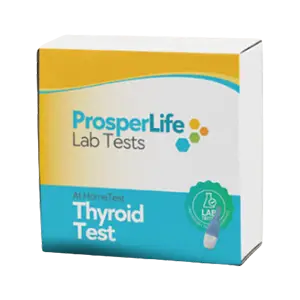GLOBAL SHIPPING | USA SHIPS FREE OVER $75
GLOBAL SHIPPING | USA SHIPS FREE OVER $75

Experts recommend regular thyroid disease screening every five years, starting at age 35, or if you’re experiencing symptoms of a thyroid condition. Stay proactive about your health and identify potential thyroid issues early on. Our comprehensive screening services offer valuable insights into thyroid health. Take control of your well-being and get screened today.
Thyroid Test Panel
Thyroid stimulating hormone is made by the thyroid gland and is released into the blood where it is delivered to tissues in the body. It helps the body stay warm, use energy, and keeps the brain, heart, muscles, and other organs working as they should. TSH can serve as an ‘early warning system’ in the body because it will indicate early changes in thyroid function before thyroid hormones become too high or too low. Because of this, measuring the TSH level in a blood sample is considered the best way to initially test thyroid function.
High TSH levels: The pituitary gland produces more TSH when the thyroid gland does not produce enough hormones. High levels are an indication that the thyroid gland is not making enough thyroid hormone (primary hypothyroidism).
Low TSH levels: Low TSH levels are an indication that the thyroid is producing too much thyroid hormone (hyperthyroidism or overactive thyroid). Low TSH may result from an abnormality in the pituitary gland. This abnormality prevents it from making enough TSH to stimulate the thyroid.
SYMPTOMS OF HIGH TSH LEVELS:
SYMPTOMS OF LOW TSH LEVELS:
The thyroid produces a hormone called triiodothyronine, known as T3. Most of the T3 in your body binds to protein. The T3 that doesn’t bind to protein is called Free T3. It helps regulate the speed with which the cells/metabolism work. It also regulates your heart rate and how fast your intestines process food. Measuring T3 in the blood is a way to determine if there is a thyroid problem.
High levels of Free T3 levels cause an excessively high metabolic rate and increased risk of hyperthyroidism.
Low levels of Free T3 levels cause slowed metabolic rate and may be a sign of hypothyroidism.
SYMPTOMS OF HIGH LEVELS OF FREE T3 LEVELS:
Low TSH levels: Low TSH levels are an indication that the thyroid is producing too much thyroid hormone (hyperthyroidism or overactive thyroid). Low TSH may result from an abnormality in the pituitary gland. This abnormality prevents it from making enough TSH to stimulate the thyroid.
SYMPTOMS OF LOW LEVELS OF FREE T3 LEVELS:
T4, also called thyroxine, is the main form of thyroid hormone made by the thyroid gland. T4 is mostly bound to proteins with a small amount unbound, or free. This test measures the amount of free/or unbound T4 circulating through the blood and indicates how well the thyroid gland is functioning.
High levels of Free T4 may be caused by certain thyroid problems such as thyroiditis, a goiter, high levels of protein in the blood, and hyperthyroidism.
Low levels of Free T4 may be caused by fasting, malnutrition, iodine deficiency, medication that affects protein levels, illness, pituitary problems, and hypothyroidism.
SYMPTOMS OF HIGH FREE T4:
SYMPTOMS OF LOW FREE T4:
Gather your personal lab sample whenever you want with our user-friendly test kit delivered right to your doorstep.
Quickly collect your sample from the comfort of your home using our ground- breaking Quick Draw device or traditional finger prick lancet.
Your lab results will be available on your personal online dashboard. Results are in an easy-to-understand educational format that helps you manage your health.
All tests are processed through our universitybacked, CLIA certified labs and HIPAA secure resultsare delivered in real time. After your test isprocessed, we offer in-depth results to not onlyhelp you make important decisions about your health in conjunction with your treating physician or medical team, but solutions to any health issues that may be discovered during the process.
Your cart is empty